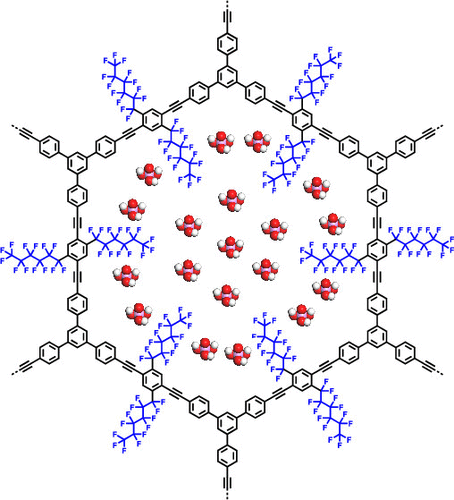当前位置:
X-MOL 学术
›
ACS Appl. Mater. Interfaces
›
论文详情
Our official English website, www.x-mol.net, welcomes your
feedback! (Note: you will need to create a separate account there.)
Conjugated Microporous Polymer with C≡C and C–F Bonds: Achieving Remarkable Stability and Super Anhydrous Proton Conductivity
ACS Applied Materials & Interfaces ( IF 8.3 ) Pub Date : 2021-03-23 , DOI: 10.1021/acsami.1c02355
Xinzhu Jiang 1 , Kun Zhang 1 , Yang Huang 2 , Bingqing Xu 1 , Xuefeng Xu 1 , Jiajun Zhang 1 , Ziya Liu 1 , Yuxiang Wang 1 , Yaoyao Pan 1 , Shuyang Bian 1 , Qihang Chen 1 , Xiaowei Wu 1 , Gen Zhang 1
ACS Applied Materials & Interfaces ( IF 8.3 ) Pub Date : 2021-03-23 , DOI: 10.1021/acsami.1c02355
Xinzhu Jiang 1 , Kun Zhang 1 , Yang Huang 2 , Bingqing Xu 1 , Xuefeng Xu 1 , Jiajun Zhang 1 , Ziya Liu 1 , Yuxiang Wang 1 , Yaoyao Pan 1 , Shuyang Bian 1 , Qihang Chen 1 , Xiaowei Wu 1 , Gen Zhang 1
Affiliation

|
Introducing nonvolatile liquid acids into porous solids is a promising solution to construct anhydrous proton-conducting electrolytes, but due to weak coordination or covalent bonds building these solids, they often suffer from structural instability in acidic environments. Herein, we report a series of steady conjugated microporous polymers (CMPs) linked by robust alkynyl bonds and functionalized with perfluoroalkyl groups and incorporate them with phosphoric acid. The resulting composite electrolyte exhibits high anhydrous proton conductivity at 30–120 °C (up to 4.39 × 10–3 S cm–1), and the activation energy is less than 0.4 eV. The excellent proton conductivity is attributed to the hydrophobic pores that provide nanospace for continuous proton transport, and the hydrogen bonding between phosphoric acid and perfluoroalkyl chains of CMPs promotes short-distance proton hopping from one side to the other.
中文翻译:

具有C≡C和C–F键的共轭微孔聚合物:实现显着的稳定性和超无水质子电导率
将非挥发性液体酸引入多孔固体中是构建无水质子传导电解质的一种有前途的解决方案,但是由于这些固体的弱配位或共价键,它们在酸性环境中经常遭受结构不稳定的困扰。在这里,我们报告了一系列稳定的共轭微孔聚合物(CMP),通过坚固的炔基键连接并用全氟烷基官能化,并将它们与磷酸结合。所得的复合电解质在30–120°C(高达4.39×10 –3 S cm –1)下表现出高无水质子传导性),且活化能小于0.4 eV。优异的质子传导性归因于疏水孔,该孔为连续的质子传输提供了纳米空间,而CMP的磷酸和全氟烷基链之间的氢键促进了短距离质子从一侧跳到另一侧。
更新日期:2021-04-08
中文翻译:

具有C≡C和C–F键的共轭微孔聚合物:实现显着的稳定性和超无水质子电导率
将非挥发性液体酸引入多孔固体中是构建无水质子传导电解质的一种有前途的解决方案,但是由于这些固体的弱配位或共价键,它们在酸性环境中经常遭受结构不稳定的困扰。在这里,我们报告了一系列稳定的共轭微孔聚合物(CMP),通过坚固的炔基键连接并用全氟烷基官能化,并将它们与磷酸结合。所得的复合电解质在30–120°C(高达4.39×10 –3 S cm –1)下表现出高无水质子传导性),且活化能小于0.4 eV。优异的质子传导性归因于疏水孔,该孔为连续的质子传输提供了纳米空间,而CMP的磷酸和全氟烷基链之间的氢键促进了短距离质子从一侧跳到另一侧。

































 京公网安备 11010802027423号
京公网安备 11010802027423号